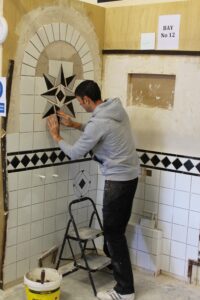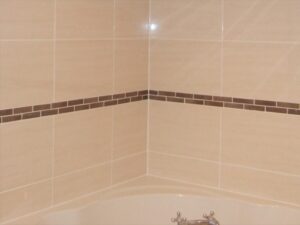What skills are needed to become a good wall and floor tiler? 
Have you ever though about starting a new career as a wall and floor tiler? Maybe you”re a keen DIYer and have already done some of your own tiling projects.
Lets see what is entailed in becoming an expert tiler.
Attention to detail
Tiling is all about attention to detail and the slightest mistake can make things go wrong, levels and spacers are a tilers best friend, if you start off level with your first row of tiles and use the appropriate spacer between the joints then it a good chance your work will be at the correct standards.
Fitness
Tiling is a physical trade so some level of fitness is involved, this can vary on the type of tiling work you are doing, kitchen splash backs tend to use small tiles in a small area so this will be one of the easier jobs to do, bathrooms especially upstairs ones will require the most fitness running up and down the stairs with tools, tiles and waste products.
Intelligence
There is an element of tiling knowledge you will have to learn in regards to background preparation, different adhesive products and types of tile. Fitting tiles is one thing, keeping them on the wall is another.
Maths
There is an element of mathematics in tiling, working out square areas of rooms, calculation of correct quantities of materials, working out a price for the job etc.
Business skills
If you are thinking of becoming self employed as a tiler then you must have the correct business skills in order to make a good living, this includes how to advertise your services, sell your services and organise / plan your day to day activities.
Experience
Prior tiling experience is not required for you to become a tiler but some good quality training is very advisable, having good DIY skills is a good starting point and the rest can be learned
Training 
UK Pro Tiling Training is the only dedicated professional tiling training facility in the UK. Here you can enrol on a fast track course where they will teach you all about the knowledge required to become a wall and floor tiler.
Courses can be as little as 1 intensive week up to 3 weeks, here you will complete various practical challenges from application of tile to cutting and shaping around objects, setting out jobs, learning about background preparations.
Every one of our tiling courses comes complete with a full self employed business start up program so you will be taught how to put your new tiling skills into practice on paying customer jobs after you have completed the training.
Contact
To find out more how you can start a new career as a wall and floor tiler, visit UK Pro Tiling Training at www.tiling-courses.co.uk for more info

 and the natural stone (slate, travertine, marble, limestone, quartz, etc.) coming in as the most expensive.
and the natural stone (slate, travertine, marble, limestone, quartz, etc.) coming in as the most expensive.